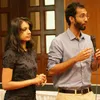Here’s how ILSS helps corporate leaders build a second career in social sector
ILSS has so far trained 112 corporate leaders in the social sector through its nine-day leadership programme. It is now aiming to help NGOs raise funds.
Most of us dream of landing a well-paid job that affords us to take those yearly international holidays, create college funds, and buy a vacation home. However, the corporate rate race can get to you after slogging for years, and people long to do something meaningful and create an impact.
One such individual is Radha Arakkal, who spent 25 years in advertising, media strategy, and communications strategy with leading global ad agencies.
But, things changed for Radha in 2018 when she ventured into social work. Today, she works with various organisations and NGOs. She has spent time improving education in rural West Bengal, transforming lives of trafficked women and children in Khajuraho, providing eldercare in Telangana, and fighting for LGBTQIA+ rights in rural Tamil Nadu.

Radha Arakkal (centre) works with several organisations and NGOs
Speaking about her transition, Radha says,
“Spending time with the board members of the organisation and the bright, enthusiastic school children set me thinking about how I reached here, a world away from what I used to do for almost 25 years of my life: helping big multinational brands grow bigger. I started asking myself about what the point of it all was. That question led me to quit my corporate job in 2018.”
Like Radha, many corporate executives have made a similar choice to venture into the social sector. Thanks to India Leaders For Social Sector (ILSS), many corporate executives have got an opportunity to use their experience and skills to make the world a better place to live in.
Founded in 2017 by Anu Prasad, Gurugram-based ILSS has mentored several people and helped them contribute to society. It has conducted six programmes, training about 112 corporate professionals, who have ventured into the social sector across India, through ILSS’ initiatives.
The beginning and the challenges
With over more than a decade worth of experience in the corporate world, Anu observed that people in their mid-40s and early-50s are looking to build a second career. In fact, these people are looking to make an impact in society. However, they do not have proper resources or guidance to execute or channel their ideas.

Anu Prasad, Founder and Director, ILSS.
Speaking to SocialStory, Anu, says,
“Social issues aren’t a problem for a specific community or a section of people. It is everyone’s problem. In fact, retired officers from the armed forces, too, want to contribute to social causes.”
To address this dilemma and provide a scalable solution, Anu met more than 100 changemakers and NGOs in the social sector to understand the various challenges faced by people. Soon, Anu realised that there is a need for leadership, expertise, and professionals to provide solutions.
In the same year, she came across a report on how the social sector needs more leadership. According to Anu, funds from philanthropists were usually dedicated for running a programme but not to build capacity or train leaders, both equally important needs.
In 2017, ILSS was also incubated at the Central Square Foundation. Equipped with resources, Anu started brainstorming to build a suitable solution to design an appropriate programme for these corporate professionals.
The path of change and leadership
Initially, Anu took a group of people from the corporate sector who had the required skills of team building and leadership management.
Following this, the course was marketed across Delhi, Mumbai, and Bengaluru, where these professionals spoke about the need for leadership in the social sector and used various social media channels to grab the attention of the corporates.

An ILSS session
Anu adds,
“In the corporate sector, if you are there for around a decade, you will come across team building and leadership management training programmes. These skillsets can be transferred and used in the social sector, but only with the help of some guidance and understanding.”
The first step towards creating this programme was to make corporates understand the various facets of the social sector. With a series of brainstorming and discussion, Anu came up with a nine-day ILSS Leadership Programme, which would focus on perspective building, leadership development, field and community visits, and guest sessions. These guest sessions include NGO leaders, policymakers, and changemakers who speak about the various challenges and the ground reality of the sector.
The main verticals of the programme, which takes place at the Ashoka University, include perspective development, demystifying the sector, understanding the self, careers in the sector, grassroot exposure, knowledge, skills, and attitude.
With a price tag of Rs 1.25 lakh, the programme is run every three months and has had 100 speakers till date. The participants are provided with accommodation, food, and course material.
Anu says that one needs to study the social sector for a year to understand it. But the programme helps in getting different perspectives of the sector and serves as an orientation.

The sixth batch of ILSS
She explains, “One has to go through a selection procedure, which includes written tests and interviews.”
Post the programme, these corporate leaders are hired by NGOs, social organisations in the education sector, the Public Health Foundation of India, Educate Girls, among others.
Anu adds,
“We not only want them to learn but also let them take up some roles in the social sector or start their own social enterprises.”
Future scope
In 2018, ILSS came out of the CSF and became an independent organisation. At present, it is being funded by Ashish Dhawan, Founder, CSF and Amit Chandra’s ATE Foundation.
According to Anu, the recent programme has been a success and ILSS is now planning to design a similar course around fundraising.
She says, “There are a lot of funds, from CSR to high-network funds, which is another pain point in the social sector as small NGOs fail to tap into them to scale their operation.”
ILSS aims to help these NGOs understand better ways of raising money.
(Edited by Suman Singh)


1554291843229.jpg?fm=png&auto=format&h=100&w=100&crop=entropy&fit=crop)






